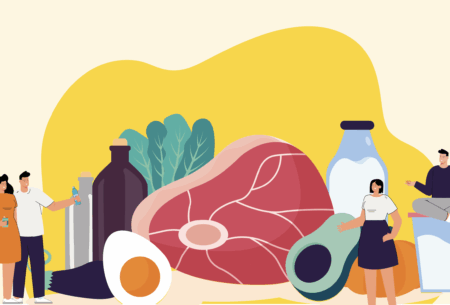What is gastritis
Gastrtritis is the inflammation of the stomach lining (your tummy, above your gut) and can have many causes. It can be acute (happen suddenly and pass quickly) or chronic (happens gradually, lasts a long time, can lead to more damage). Although they sound similar, gastritis is different to gastroenteritis or stomach/peptic ulcers.
What are the signs of gastritis
Signs of gastritis can include:
- Stomach (tummy) pain
- Indigestion (pain or burning around your tummy or breast bone)
- Feeling sick (nausea)
- Being sick (vomiting)
- Feeling unusually full and bloated
- Not feeling as hungry as usual
- An unusual increase of burping and farting
What causes gastritis
- Infection from bacteria, such as Helicobacter Pylori (the most common cause)
- Infection from other organisms e.g. Mycobacterium avium intracellulare, Herpes simplex, and Cytomegalovirus
- Frequently drinking alcohol
- Smoking tobacco
- Long-term taking of non-steroidal anti-inflammatory drugs (NSAIDs) e.g. aspirin and ibuprofen
- A stressful event, such as a bad injury, critical illness or major surgery
- An autoimmune reaction where the body wrongly attacks its own cells
How is it diagnosed
Depending on your symptoms, age, other medical conditions etc. your doctor may do the following tests:
- Stool sample
- Blood test
- Breath test to test for H.Pylori
How to treat gastritis
How it’s treated depends on the cause of your gastritis:
Medically
- Most commonly, acid-reducing medications are given to help reduce the irritation caused to the stomach lining, so it can heal and the symptoms reduce.
- Sometimes ‘barrier’ medications are given which they form a barrier on top of the stomach acid to reduce the pain felt in the chest when acid rises into the food pipe.
- If the gastritis is related to particular organisms e.g. H Pylori, then specific antibiotics or similar are given short-term to clear the infection.
- If the cause is autoimmune related (quite rare), then immune-acting medications may be given.
Diet
Diet can absolutely help with gastritis! At The Gut Health Clinic we frequently support people to minimise their symptoms and get back to living the life they want – we see brilliant results!
Gastritis support
The main way diet changes manage gastritis is by reducing the irritation to the stomach lining and the pain this causes. It can also work by reducing how ‘loose’ the muscle between your food pipe and stomach is. This minimises the burning feeling and acid feel people may get in their chest and mouth. Another way is by helping the way food passes from your stomach to your gut.
Food/drinks to have less of:
- Alcohol
- Spicy foods
- Acidic drinks and food e.g. fruit juice, fizzy drinks, and citrus fruits – some people may find tomatoes worsen symptoms
- Fatty and fried foods
- Chocolate (it loosens the muscle between the food pipe and stomach)
- Caffeinated drinks e.g. tea, coffee, energy drinks, cola-type drinks (they stimulate stomach acid production)
- Some people report onion and spring onion can worsen the chest pain due to acid in their food pipe
Other helpful food/drink tips:
- Eating regular meals, e.g having your main meals 4-5 hours apart rather than long gaps
- Having regular portion sizes rather than large meals, some advice is available here: https://www.nutrition.org.uk/media/ohunys2u/your-balanced-diet_16pp_final_web.pdf
- You don’t need to switch to low-fat dairy and similar products, you can trial a half or full portion size to test your tolerance while you have the gastritis
Key lifestyle tips:
- Not smoking
- Try not to lay down for two or so hours after eating
- Sleeping on your left-side (the stomach is lower than your food pipe so less acid will enter your food pipe)
- Sleeping on an extra pillow to raise your head and shoulders higher than your stomach
Can probiotics help with gastritis?
There is some research in both children and adults showing that taking a probiotic that contains Lactobacillus can help treat gastritis when taken alongside antibiotics for treating infection-caused gastritis.
The probiotics are best taken daily for two weeks, but the treatment is more effective when taken for four weeks.
Can supplements help with gastritis?
At the moment there isn’t enough good quality research to suggest taking other supplements to prevent or treat gastritis.
If you take anti-acid medications long-term, we would recommend occasionally getting your B12 levels checked as the medication can reduce how well we absorb B12 from our foods and drinks. You may then want to increase the B12 content of your diet. Guidelines suggest that adults (19-64 year olds) require 1.5micrograms a day of vitamin B12.
Good sources of Vitamin B12 include:
- Meat
- Fish
- Eggs
- Milk
- Cheese
- Some fortified breakfast cereals
If you eat these sources listed above, you should be able to get enough vitamin B1. However, as vitamin B12 is not found naturally in foods such as fruit, vegetables and grains, vegans may not get enough of it. Therefore if you are eliminating animal derived foods, the only reliable sources of vitamin B12 are fortified foods and supplements.
Suitable B12-fortified foods include:
- Some breakfast cereals
- Yeast extracts
- Soya yoghurts
- Non-dairy milks
To make sure you get enough vitamin B12, either eat fortified foods at least twice a day (aiming for 3mcg of vitamin B12 a day) or take a supplement – 10mcg daily or at least 2000mcg weekly.
In summary
- Gastritis can last short-term or long-term.
- It can be a very painful and limiting condition.
- There are lots of ways to manage it medically.
- Diet changes can make a big difference!
- There are lots of lifestyle techniques to consider too e.g. how you sleep.
Need extra support?
If you have gastritis and are struggling or would like some assistance to implement some of the steps above, book an appointment with me here via the Gut Health Clinic for a more individual assessment and tailored advice!
Resources for you
General reading and tips:
- The GUTS charity’s information page on gastritis https://gutscharity.org.uk/advice-and-information/conditions/gastritis/
- NHS advice page https://www.nhs.uk/conditions/gastritis/
If you’re interested in some academic reading:
- The online book called ‘Gastritis’ by researchers Samy A. Azer and Hossein Akhondi, last updated 4th of July 2022: https://www.ncbi.nlm.nih.gov/books/NBK544250/
A scientific article about chronic gastritis published in a journal. Written by researchers Pentti Sipponen and Heidi-Ingrid Maaroos, published April 2015: https://www.ncbi.nlm.nih.gov/pmc/articles/PMC4673514/












